Season 2, Episode 5
Annual Goal Planning
Most of us enjoy sitting down with a favorite beverage and making plans for the future. But life will always throw a wrench in those plans. In this episode of YBH, we discuss what annual planning offers the entrepreneur and whether it is worth your time… or is a waste of time.
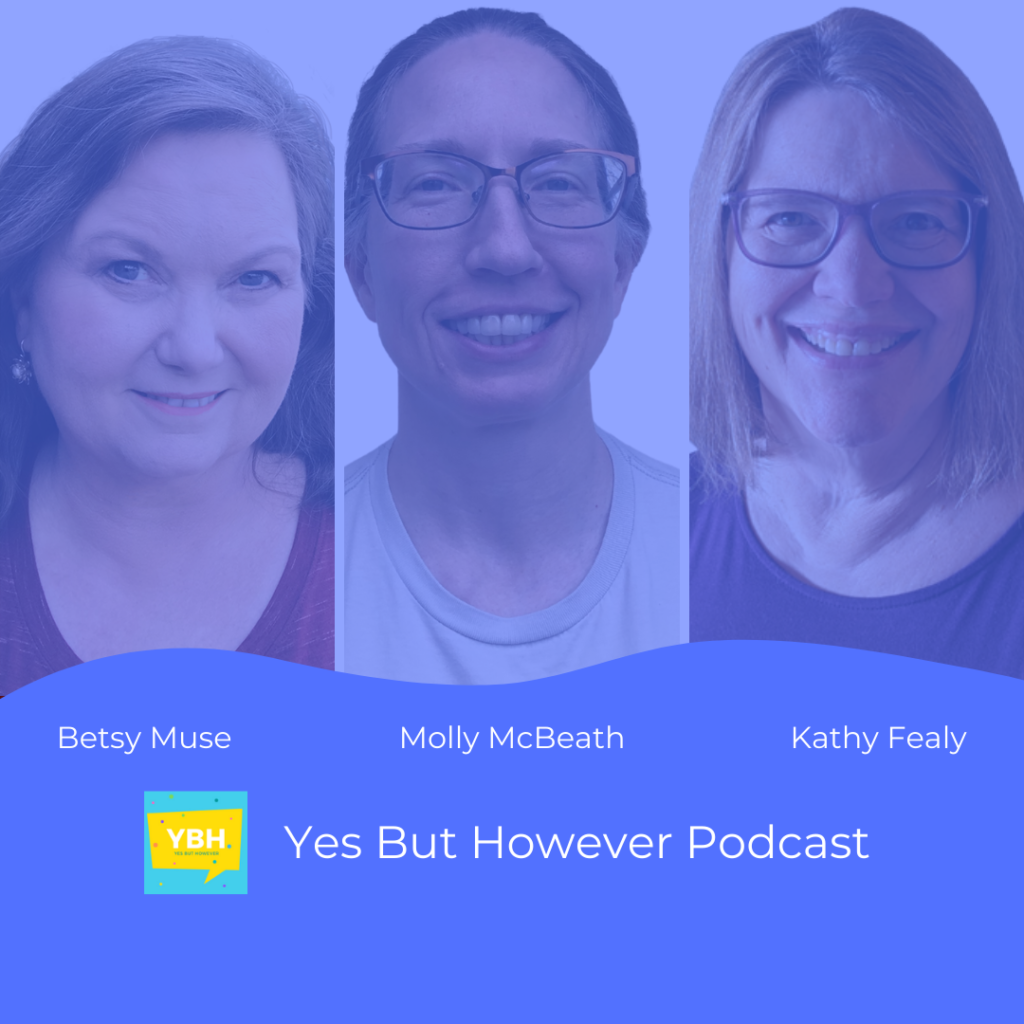
About this Episode
Most of us enjoy sitting down with a favorite beverage and making plans for the future. But life will always throw a wrench in those plans. In this episode of YBH, we discuss what annual planning offers the entrepreneur and whether it is worth your time… or is a waste of time.
Transcript
Betsy Muse 0:07
Kinda like, don’t edit while you write, don’t edit while you dream. Go ahead and dream it. You know, think about it.
Molly McBeath 0:18
Hello and welcome to Yes, But However a podcast about marketing business and real life. I’m Molly McBeath with my cohosts Kathy Fealy and Betsy Muse. We’re coming into fall which is when many people sit down to review the year that was and think about the year ahead, but is annual planning worth the time or does it just set you up for disappointment when life interferes with those best laid plans?
In this episode of YBH we talk about which parts of annual business planning we find valuable and what we do when the inevitable curveball comes our way. Okay, so this is supposed to be a discussion today about annual planning. Do you or do you not? I am a new annual planner I think Betsy is a long term annual planner. I Kathy I think you don’t do annual planning at all.
Kathleen Fealy 1:09
Very very limited. Okay.
Molly McBeath 1:13
So we’ve got pretty different perspectives on this.
Kathleen Fealy 1:16
What do you mean yes, that however, it’s a little, more, and lots.
Molly McBeath 1:21
Yeah, exactly.
Kathleen Fealy 1:22
Why don’t we start with lots – Betsy.
Molly McBeath 1:26
What do you think is the value of annual planning
Betsy Muse 1:28
Every year I can reset my North Star for that year. It’s, it absolutely helps me clarify the direction I’m going in and the steps I need to do to go through to get there. And that’s I just think that’s essential for any business. And this is business planning. And personally do I have plans? Yeah, I do. But this is I use this for business planning.
Kathleen Fealy 1:56
Molly, what about you? Why didyou start doing it?
Molly McBeath 2:00
Betsy made it sound so good. Betsy made me. That’s my that’s my answer. I’m sticking to it. Um, no, I do want to be more intentional. And that is one of the things that I like about it. I know it that it’s a false sense of controls, and it’s not really a sense of control. But I think it’s a sense of purposefulness that I like
Betsy Muse 2:33
It keeps me from feeling scattered. And and I think for me the way I’ve always approached it is it’s not a hard and fast rule. It’s a guideline. And but I have to have my my schedule or my path in order to veer from it. So because I always come back to that path,
Molly McBeath 3:00
would you lightly briefly go over what you do for an annual planning
Betsy Muse 3:06
Woo it’s hard to lightly briefly go
Molly McBeath 3:09
I know, that’s not a fair question.
Betsy Muse 3:11
It is. It is a long process. And I do have a formal book and guide which I use. I revisit questions personal questions each year, you know what, what what? They’re they’re deep questions and I sit with them and I do everything that I can to refocus myself on my personal inner goals, what I want for my life, what I want others to see that I do in the community, and what I want my children to think of when they think of me in my career and my business because I’ve been self employed for a long time. So I really think about these things as I’m making my annual plan.
Kathleen Fealy 4:03
And my so how would you do your annual plan? How, what’s your like? What do you do for a timeline? Do you do your is it just for a year or do you have like a one year a five year? How do you do it?
Molly McBeath 4:20
Yeah, that’s encouraged me to do that one year, five year and 10 year brainstorm, let’s call it and I really struggled with the idea of five and 10 year planning because, to me, that’s this just so hard to be tangible about, you know, that’s not the right word, but so that was, that was really challenging. But I get the point of thinking, Well, where do you want to be? And, yeah, how you exactly you get to that location as as the Unitarians like to say there are many paths to the mountain. So you don’t have to get there the same way as you originally laid out. But where do you want to end up? You think right now today? And it’s okay, if you decide you want to go to a different mountain. We want to go to the coast instead.
Betsy Muse 5:15
Yep. Yeah, it is. It gets harder and harder for me to think about five and 10 years the older I get because I see it as being Oh, I might only have 10 years left, so we’re talking end of life here. No, that’s terrible.
Molly McBeath 5:38
dark.
Betsy Muse 5:39
It’s getting dark. No, seriously, it’s I just I’ve enjoyed that part of the brainstorm because I think, you know, this is pie in the sky stuff. I don’t have to be reasonable. I just want to put it out there. You know what if you know I do want to travel the world or I want to sail around the world by myself. That’s not gonna happen, but it’s certainly not going to happen. If I don’t put it out there. If I don’t write it down. If I don’t think about it.
Molly McBeath 6:11
I like the aspect of it of not of being let’s have no no major regrets. Let’s be honest with ourselves about what you really want.
Betsy Muse 6:21
Right, even if even if, you know also don’t edit it. Kind of like don’t edit While You Write. Don’t edit while you dream. Go ahead and dream it. You know think about it.
Molly McBeath 6:33
So yeah, so I did that. Kind of process. For me, it changed some things, some ways that I was approaching my business. So that was helpful.
Um, I, I think it and then and then going through our yearly plan for how I would start to take steps towards that five year goal. That got blown in March of this year. For me for a family emergency. So I am very off already, halfway through the year now and because we’re recording this in June that will come out by the end of the year, but hey, people, we plan ahead. And so it helps me it has helped me recognize what’s a shiny object. I can stay on task.
Kathleen Fealy 7:25
I’m doing annual planning. I think I used to at one point in my life, but then I realized I was going off course so often then I would beat myself up for not reaching those goals or whatever. So now I more envision what I’d like it to be. I will take time to notice where there’s issues or problems in the business that aren’t working the right way so that I can come up with a solution. But then I don’t think of it so much as annual planning as more as I think of my businesses are almost like a client project. And so like, you know, if a client hires me, they hire me for A, B and C. And so I will work and get the strategy together for a b and c and then I will do all the tasks that are necessary for that. And I sort of feel the same way about my business. If something’s not working then there’s something wrong with the strategy. So I shifted my strategy, and then I put into place various tasks. So I never really think of it as planning like, where am I going to be by next year at this time? Or where am I going to be at this? I sort of look at it like, okay, for these three months I’m working on this for these people and in between, I’ll have a chance to do A, B and C for my business. And then this month right now I would like to be able to make sure I could take some time off. So that’s like my annual planning I mean, it’s really not anywhere when lines of what you choose to do, because I’ve just found it just doesn’t seem to make a difference for my business when I’m making an annual plan. I mean, it’s nothing that I don’t visualize what I want, and I don’t take any actions. It’s just I find that I’ve never been a really good person for like the New Year’s Eve or the you know, the New Year’s Day resolutions or anything like that where people have like, what they want to do for the year and stuff that’s just never been really part of my game plan especially last couple of years and I think part of it was because people in the very beginning of my starting my business kept telling that habit, business plans and business, you know, you know, just a whole strategy for it. And I would find that it was always blown out in the water by getting too many clients at the same time or not enough clients or whatever. And it just, you know, I just found that was actually a waste of my time, which probably is blasphemous to everyone as a business person and especially if you’re a banker that gives me a loan, please jump through this podcast.
Betsy Muse 10:08
See that having the plan. Having a plan is actually what keeps me from doing the feast or famine and getting flooded with clients. If I know what is coming up throughout the year and what I’m planning to do or launch, then I know what what client load I can take. And so I’m not going to pitch a client or a prospect if I don’t have the bandwidth to do the work. And the only way to really know that is to have that advanced for me to know that is to have that advanced planning in place. I don’t want a situation where I have too many clients. I know that that might sound blasphemous to some people, but it isn’t a good situation, especially if it stretches you so that I don’t want to get myself in that situation. Any more than I want to get myself in a situation where I don’t have any clients. So that’s what it does for me. I know it it’s gonna look different for everyone. It’s because annual you know, some people don’t I do Review My Plan every month and I look at the granular task lists. And I just I think that I agree with Kathy in the sense that early on, I would look at the task list and if I wasn’t doing enough if I wasn’t accomplishing enough, or if I did veered off path too far and was it I might be doing something else really cool. But if it wasn’t on the list, you know, I would let that kind of set me back. You know, and it stopped me in my tracks because all of a sudden I’m totally off course. It wasn’t necessarily a bad thing. But I was too rigid with my plan. And so over time, I’ve learned how to just use it as that North Star but not necessarily something that I have to you know, color in the lines or stay in the lanes or whatever you want to call it. Yeah, I
Molly McBeath 12:14
think that has always been my struggle too. We’ve spoken before about my literal mind. And so you know, it’s hard for me to say to make a plan even with myself and then not follow through with it and not feel bad because I didn’t follow through with it. I think that was why I didn’t do any planning. For a long time. So yeah, trying to be less rigid about right what what I think I can actually get done and what I do actually get done
Betsy Muse 12:45
right because I think Kathy is right that you know if you’re if you make that rigid plan if you if you go to all that trouble because annual planning does take time. That’s a huge it takes a huge amount of time in the I do it in the fourth quarter. Some people do it in the third quarter. But you know, that does take a tremendous amount of time, especially if you’re we’re working plans out in granular task lists or trying to do it all at once. But you know, I can absolutely see what Kathy saying when she’s like, you know, as soon as I got off path, I felt like it was a waste of my time. And I think it’s it can even be more than that it can be dangerous. It can actually send you off path. If you aren’t paying attention to you know, if you’re trying to be too rigid, because it can get it can get upsetting because you’re not meeting my goals. I’m not meeting my goals, but you might be meeting other goals. So yeah, I I’ve learned over time to be flexible.
Kathleen Fealy 13:51
It also depends on how you I mean, a lot of people look at you know, setting annual goals and annual plans for your business but it’s not less again, that’s not like I don’t have goals for my business and I don’t I just adjust them as I see necessary. I think part of that came in. Several years ago, I had a life event that happened in my family which caused all the plans and I had that spent that year making a very specific plan as to how I was doing things which months things were going to happen, etc, etc. And it got totally blown out of the water. And it took a while to get back on course to keep the analogy of but the fact was that it was also a great learning experience for me because I realized that if I just sort of set goals like you know, like, even like when I moved to Denver, one of my big goals was to go out and meet more people in business. Now of course my timing was off because COVID showed up at (unintelligible) everything that protein time, but it did also force me to get me more people in zoom, etc, etc. But I mean, so it’s like little goals like that, but I know that they have a great effect on my business overall because I’ve been doing this now for a long time. So I know what steps I need to always make sure I’m doing and I think that’s part of like, it’s not so much an annual plan but I sort of have to this checklist like am I doing certain things to keep me on track like am I billing on time am I you know, doing some continual education? Am I trying some new things? Am I saying yes to one project that scares me, you know, those kinds of things, then that’s part of my very, very, very useful good annual plan.
Molly McBeath 15:50
So do either view and I’ll say right up front, I do not do with people I know set targets for how much they want to make in a quarter usually. Do either of you ever tried that and
Betsy Muse 16:06
I absolutely do revenue planning.
Molly McBeath 16:08
That’s what it’s called revenue. Ideal
Betsy Muse 16:12
revenue planning. I know. I even work it out too. I know which of my offers you know what I would have to sell of each offer to meet that revenue goal. So I have a very specific plan. And I know that if I’m short one quarter what I need to do to make it up the next quarter. I’m pretty ambitious with that goal. And also know that because I’m a little overly ambitious that I don’t really have to make it up. If I don’t want to in order for my family to survive. But yeah, absolutely have targets.
Molly McBeath 16:53
Well, I know some people have targets like this is this is my rate. You know, not the last hour really but my project rate for example is is basically x and next month is going to be x plus 1000. And the month after that it’s x plus 2000 and things like that, and I would find that I think kind of demoralizing because I don’t think you can successfully run a business like that. of constantly expecting yourself to be always increasing your rate just can’t you know every single time but maybe those are those are people who don’t have ongoing clients like I do. I can’t constantly be raising my rates to clients I’ve been working for for seven years.
Betsy Muse 17:43
Well, I do raise my rates annually. And that’s one of the things that no, not monthly, but I do believe that once you’ve mastered something so let’s say that all of a sudden I decided I was going to be an email specialists. Then as I’m writing emails sequences for clients, my rates might rise quarterly, you know if I’ve successfully completed the sequences and we’re starting to get feedback on the sequences showing that the numbers are there, then I might, you know, raise those rates but I don’t have now that I don’t have mapped out. I don’t have it like Okay, so I’m going to earn this much on sales pages. And my rates going to increase by this much. Yeah, I don’t do that. I have but I do have revenue goals for the year and for that for each quarter. And I also I know that some years Summer months can be a little slow. They haven’t been slow for me revenue wise. They’ve been slow for me client wise. It’s like a get fewer clients in the summer months, but they tend to spend more.
Molly McBeath 19:02
Weird
Betsy Muse 19:03
I know
Molly McBeath 19:04
That sounds nice
Betsy Muse 19:05
The past few years, that’s what its been
Molly McBeath 19:08
I guess I do have revenue goals but I keep them so modest I know I can hit them
Betsy Muse 19:17
Nothing wrong with that. Nothing wrong with that at all.
Molly McBeath 19:21
So you know pretty much everyone’s like Hey, I made this is the other thing though. That I I’m almost embarrassed to admit but I’m gonna throw it out there that Betsy suggested I do when we’re talking about annual planning was that the first thing I plan was my time off. And I had never done that for a whole year like just mapped out when am I taking time off? And I loved doing that. That was so nice.
Kathleen Fealy 19:53
Did it work?
Molly McBeath 19:55
Um, yes. Actually. Well so far. I mean, it’s a we’re only halfway through the year and I’m still planning some time that I haven’t taken off yet because it’s, you know, November that I’m planning to take some time off again, but yeah, I did take the time off that I had planned. Yeah, he did some COVID-friendly vacationing. It was really nice.
Betsy Muse 20:17
I have not obeyed my own suggestion as well. I did map a lot of things out. But I had a lot of launches planned in the spring and chose to not do them, which was actually almost giving myself time off. So since my schedule wasn’t as hectic, but since my schedule…
Molly McBeath 20:41
You were not lying around with bonbons
Betsy Muse 20:43
Yeah, I was not lying around with bond bonds but I did just go on a vacation where I left the house. So I have not kept up with the schedule that I set. But I’ve definitely taken more breaks than I did last year.
Molly McBeath 21:00
What about you, Kathy? Do you plan your time
Kathleen Fealy 21:03
I would love to plan time off? I am fortunately and have a partnership with a husband who is just as nutty in his schedules. That sort of I am and to coordinate both of our times for this type of downtime for our clients. It has done really difficult so we try to make the most of our weekends now. Because that’s guaran sort of guaranteed time off, although sometimes we each have something we have to get done for somebody. But we’re trying if it’s anything in the family member, we’re much better at making the plan because that person needs to know that we’re showing up. So we have to make date if it’s um but if it’s scheduling vacation for the two of us that has that has gotten more complicated over the years as we’ve gotten both very busy. That’s why I wondered it actually planning actually made a difference because I can’t figure out how to coordinate the schedules… my husband’s schedule.
Molly McBeath 22:16
I didn’t I didn’t even consult what I did on the on the cabin trip that we took, which was just a long weekend. I did check with him but that the rest of the time that I’m taking out, I’m taking off myself and if he’s free, awesome and if he’s not free, to bad for him. Don’t taking it off.
Kathleen Fealy 22:34
See I like going on trips so it’s more fun if I can go with him
Molly McBeath 22:40
it’s a little different with COVID they’re like well, I don’t think we’re gonna go anywhere. Now it’s loosening up but it’s my going anyway. Yeah,
Betsy Muse 22:49
I went with my daughter and my mom. So my husband stayed home with a dogs. That was a change in roles usually that’s what I do. I take care of the dog while he travels for work. Yeah, so, matter of fact, maybe this weekend, I’ll revisit the rest of the year and see what days I can set aside for time off.
Molly McBeath 23:12
Oh, that sounds lovely. Yeah, I impromptu decided to take the week of after July 4 of this year. So that was not in my annual plan, but I decided because I kept talking to so many people are saying yeah, I’m taking the week after July 5 or July 5 to the whatever it is the ninth off, you know, I’m gonna do that. But yeah, I’d like to take a little bit more time off in the fall too. So yeah, maybe a halfway through annual plan.
Kathleen Fealy 23:45
So you know, you’ve convinced me I will become an annual planner. I’m going to take my vacation.
Molly McBeath 23:52
Vacation. Yeah.
Kathleen Fealy 23:53
So occasionally the part that I will definitely mark and plan and keep budget for how much your greatest spend on that vacation
Betsy Muse 24:04
Kathy, we’ll get through step one and be like nah, I’m bored with this, but I got the important one done.
Kathleen Fealy 24:13
Oh, it is Yes But however
Betsy Muse 24:17
but if we want to resolve this if we want anything. To, to wrap that up with this is what I would say is anyone who’s interested in creating an annual plan, you can sit down and do it with a plain old notebook and just think for yourself. You don’t need to buy a whole lot of planners and you don’t need to pay someone gobs of money to get something fancy. Just just write it all out for yourself in a notebook. You don’t have to spend a lot of money on this
I just cussed
Kathleen Fealy 25:01
We’re gonne stop recording, now that Betsy’s swearing again.
Betsy Muse 25:05
Please don’t include
Kathleen Fealy 25:12
this has been Yes. But however, I’m Kathy Fealy with my co host Betsy Muse and Molly Macbeth. This episode was written, edited and produced by the three of us. Our theme music is turist in Punta Cana which is available through Audio Hero. The show’s website, where we post shownotes transcripts and more information about us can be found it yes but however podcast.com You can contact us through the website or email us at talkers at yes but however podcast.com Thanks for listening
Molly McBeath 25:59
it’s time for the disclaimer. The information opinions and recommendations presented on yes but however are for general information only and any reliance on the information provided in this podcast is done at your own risk. No part of this podcast should be considered professional advice. Any products or services mentioned on this podcast come from our personal experience and no person or company has paid for a mention or placement. Thanks and have a great day.
Featured Podcasts

October 2021
S2, Ep 1 - Imposter Syndrome
Should you tackle or embrace Imposter Syndrome? Join Molly McBeath, Betsy Muse and Kathy Fealy as we discuss how each of us face this little creature that rears its ugly head from time to time – oh, and anything that creates this much havoc isn’t pretty.
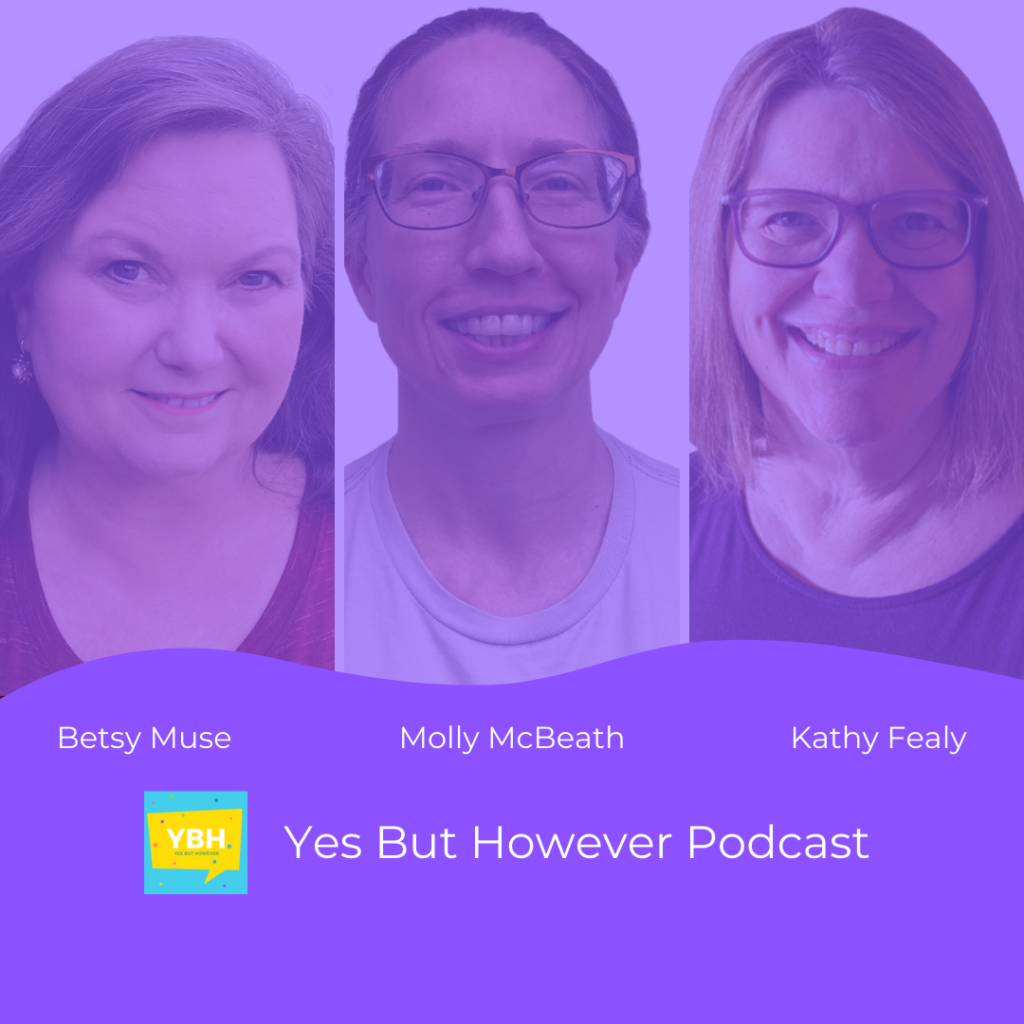
October 2021
S2, Ep 2 - Feast and Famine
The feast and famine cycle is famous in entrepreneurship. But is it inescapable? And if it is, would you want to leave it altogether or just smooth it out a bit? We discuss what we appreciate about the fast times and the slow slogs and how each of us approaches this cycle.
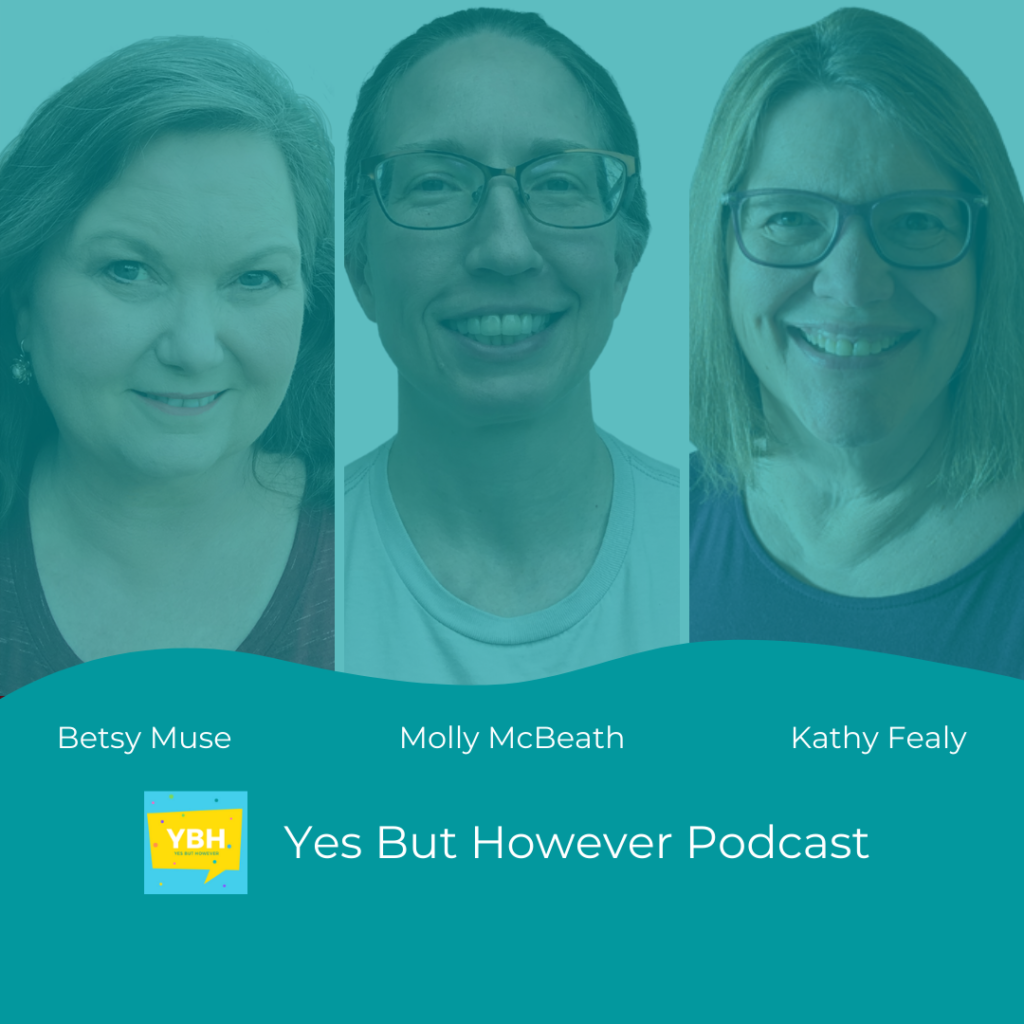
October 2021
S2, Ep 3 - Lessons Learned
Kathy Fealy, Molly McBeath, and Betsy Muse discuss how we each have made changes to our business and lives based on the lessons we’ve learned in the trenches – and both Molly and Kathy learn a new networking technique based on Betsy’s insight.

